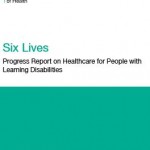
Ian Cummins reviews a recent systematic review of interventions designed to support SDM and asks: can shared decision-making reduce health inequalities?
[read the full story...]
Ian Cummins reviews a recent systematic review of interventions designed to support SDM and asks: can shared decision-making reduce health inequalities?
[read the full story...]
Caroline De Brun highlights the new guidance for commissioners of mental health services for people from black and minority ethnic communities, produced by the Joint Commissioning Panel for Mental Health.
[read the full story...]
During her presidency of the BMA, Professor Sheila Hollins has hosted a number of seminars on issues faced by vulnerable groups in the NHS, one of which looked at the issues facing people with learning disabilities. This report by the BMA Board of Science aims to move towards ‘parity of esteem’, a term which is [read the full story…]

Background Personal Health budgets were introduced to enable people with long term conditions and disabilities to have greater choice, flexibility and control over the health care and support they receive. This month (April 2014), people who are eligible for NHS Continuing Healthcare (NHS CHC) will have the right to ask for a personal health budget. [read the full story…]

Last year, we posted a guest blog by Pauline Heslop, a researcher at the Norah Fry Research Centre, who set out the alarming findings of a confidential enquiry into premature deaths of people with learning disabilities. The enquiry found that people with learning disabilities die significantly younger in England and Wales than people without learning [read the full story…]

Substance use is common in people with mental health problems, and this can have important negative consequences for health and social function. The high comorbidity of mental health problems and substance use is a major contributor to the shorter life expectancy of this population – a person with a severe mental disorder can expect to [read the full story…]

In the current economic climate in many countries across the world, the impact of socio-economic inequalities on mental health has become an important topic, not only in terms of supporting people, but in terms of planning a public health response to a rising concern. Poverty and low economic status is known to affect various aspects [read the full story…]

The Six Lives report in 2009 investigated the provision of public services to people with learning disabilities following the deaths of the six people with learning disabilities highlighted in Mencap’s Death by Indifference report. The Department of Health in its response committed to providing progress reports on the recommendations and this report has been recently [read the full story…]

Carers are integral to health care improvement. This report highlights evidence that shows “the economic value of the contribution they make is £119bn per year”. However, without support, carers can feel isolated, depressed, and may be living in poor financial circumstances, which can lead to poor health for the carer too. The problem health and [read the full story…]

Rational commissioning This report describes a project, led by Right Care, to involve surgeons in the commissioning decision-making process, because observations made by the Department of Health and Surgical Specialty Associations showed that there were inconsistencies in the rates of elective surgical procedures between Primary Care Trusts, and that sometimes existing surgical procedures were “classified [read the full story…]